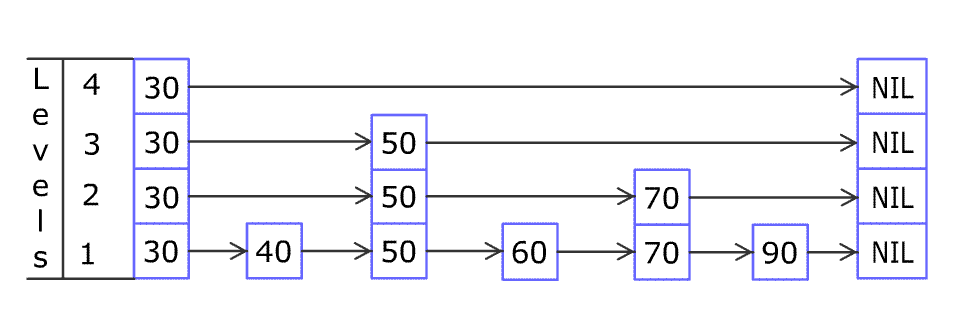LeetCode in Kotlin
1206. Design Skiplist
Hard
Design a Skiplist without using any built-in libraries.
A skiplist is a data structure that takes O(log(n)) time to add, erase and search. Comparing with treap and red-black tree which has the same function and performance, the code length of Skiplist can be comparatively short and the idea behind Skiplists is just simple linked lists.
For example, we have a Skiplist containing [30,40,50,60,70,90] and we want to add 80 and 45 into it. The Skiplist works this way:

Artyom Kalinin [CC BY-SA 3.0], via Wikimedia Commons
You can see there are many layers in the Skiplist. Each layer is a sorted linked list. With the help of the top layers, add, erase and search can be faster than O(n). It can be proven that the average time complexity for each operation is O(log(n)) and space complexity is O(n).
See more about Skiplist: https://en.wikipedia.org/wiki/Skip_list
Implement the Skiplist class:
Skiplist()Initializes the object of the skiplist.bool search(int target)Returnstrueif the integertargetexists in the Skiplist orfalseotherwise.void add(int num)Inserts the valuenuminto the SkipList.bool erase(int num)Removes the valuenumfrom the Skiplist and returnstrue. Ifnumdoes not exist in the Skiplist, do nothing and returnfalse. If there exist multiplenumvalues, removing any one of them is fine.
Note that duplicates may exist in the Skiplist, your code needs to handle this situation.
Example 1:
Input
[“Skiplist”, “add”, “add”, “add”, “search”, “add”, “search”, “erase”, “erase”, “search”]
[[], [1], [2], [3], [0], [4], [1], [0], [1], [1]]
Output: [null, null, null, null, false, null, true, false, true, false]
Explanation:
Skiplist skiplist = new Skiplist();
skiplist.add(1);
skiplist.add(2);
skiplist.add(3);
skiplist.search(0); // return False
skiplist.add(4);
skiplist.search(1); // return True
skiplist.erase(0); // return False, 0 is not in skiplist.
skiplist.erase(1); // return True
skiplist.search(1); // return False, 1 has already been erased.
Constraints:
0 <= num, target <= 2 * 104- At most
5 * 104calls will be made tosearch,add, anderase.
Solution
@Suppress("NAME_SHADOWING", "kotlin:S2245")
class Skiplist @JvmOverloads constructor(size: Int = INIT_CAPACITY) {
private val minBoundary: Int
private val head: Node
private var headCapacity: Int
private var headLevel = 0
class Node internal constructor(val `val`: Int, level: Int) {
var next: Array<Node?>
init {
next = arrayOfNulls(level)
}
}
init {
var size = size
require(size != 0) { "size should be greater than 0" }
if (size < INIT_CAPACITY) {
size = INIT_CAPACITY
}
minBoundary = size / 2
headCapacity = size
head = Node(0, size)
}
fun search(target: Int): Boolean {
var curr: Node? = head
for (i in headLevel - 1 downTo 0) {
while (curr!!.next[i] != null) {
val cmp = target - curr.next[i]!!.`val`
curr = if (cmp < 0) {
break
} else if (cmp > 0) {
curr.next[i]
} else {
return true
}
}
}
return false
}
fun add(num: Int) {
val update = arrayOfNulls<Node>(headLevel + 1)
update[headLevel] = head
buildUpdate(num, update)
val level = randomLevel
if (level > headLevel) {
if (headLevel == headCapacity) {
resizeHead(2 * headCapacity)
}
headLevel++
}
val x = Node(num, level)
for (i in 0 until level) {
val n = update[i]!!.next[i]
update[i]!!.next[i] = x
x.next[i] = n
}
}
fun erase(num: Int): Boolean {
if (headLevel == 0) {
return false
}
val update = arrayOfNulls<Node>(headLevel)
buildUpdate(num, update)
if (update[0]!!.next[0] == null || update[0]!!.next[0]!!.`val` != num) {
return false
}
for (i in 0 until headLevel) {
if (update[i]!!.next[i] == null || update[i]!!.next[i]!!.`val` != num) {
break
}
update[i]!!.next[i] = update[i]!!.next[i]!!.next[i]
}
if (head.next[headLevel - 1] == null && --headLevel >= minBoundary && headLevel == headCapacity / 4) {
resizeHead(headCapacity / 2)
}
return true
}
private fun buildUpdate(x: Int, update: Array<Node?>) {
var curr: Node? = head
for (i in headLevel - 1 downTo 0) {
while (curr!!.next[i] != null && curr.next[i]!!.`val` < x) {
curr = curr.next[i]
}
update[i] = curr
}
}
private val randomLevel: Int
get() {
val maxLevel = 14
var level = 1
val limit = maxLevel.coerceAtMost(headLevel + 1)
val p = 0.5
while (Math.random() < p && level < limit) {
level++
}
return level
}
private fun resizeHead(size: Int) {
val copy = arrayOfNulls<Node>(size)
System.arraycopy(head.next, 0, copy, 0, headLevel)
head.next = copy
headCapacity = size
}
companion object {
private const val INIT_CAPACITY = 8
}
}

